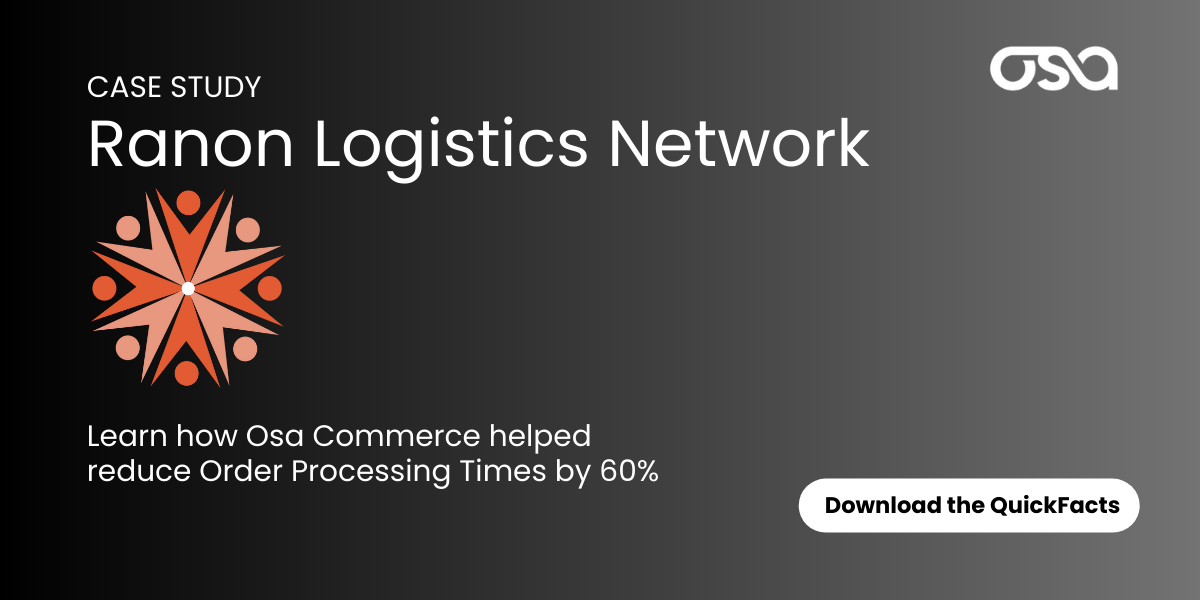
In today's highly competitive retail landscape, creating personalized experiences is a crucial strategy for attracting and retaining customers. While many retailers focus on customer-facing aspects like tailored recommendations and promotions, there's an often-overlooked goldmine for personalization: supply chain data. So how can retailers harness the power of supply chain data to craft exceptional and personalized shopping experiences?
Supply chain data encompasses a wealth of information, including product movement, inventory levels, shipping times, and much more. Retailers typically use this data to optimize operations, reduce costs, and ensure products reach shelves efficiently. However, this trove of information can also be leveraged to enhance the customer experience.

Osa Commerce Launches AI-Powered Retail Compliance at Manifest 2026, Targeting $5 Billion Chargeback Problem

Why Unified Commerce Integration Is the Foundation of Scalable Supply Chains
.jpg)
Standing At The Crossroads: The Dawn Of Agentic Commerce
Inventory Visibility
Even for retailers, having a real-time view of inventory across all channels is essential. This data enables them to accurately communicate product availability to customers. When customers know that a product is in stock and can be delivered promptly, it fosters trust and satisfaction.
Imagine a scenario where a customer shops online, chooses an item, and sees an immediate notification that the product is available for same-day delivery or in-store pickup. This level of inventory visibility relies on robust supply chain data and can significantly improve the shopping experience. To achieve this kind of transparency for their customers, retailers should invest in a collaborative visibility platform to ensure that all partners in their supply chain are well aware of inventory levels.
Efficient Order Fulfillment and Delivery
34% of businesses struggle with unavailable products and delayed packages. Supply chain data plays a pivotal role in ensuring orders are fulfilled promptly and delivered efficiently. Retailers can use this data to optimize their logistics operations, reducing delivery times and costs. In turn, customers receive their purchases faster and with fewer hiccups, leading to improved satisfaction.
Moreover, personalized delivery options, such as choosing a convenient time slot or location, can be made available based on supply chain data. This tailoring of the last-mile delivery experience can set a retailer apart from the competition.
Product Recommendations and Assortment Planning
Supply chain data provides valuable insights into product performance. Retailers can analyze sales data to identify trending products and customer preferences. This information can drive better assortment planning and personalized product recommendations.
For instance, if a particular type of shoe is selling exceptionally well in a specific region, a retailer can use this data to highlight similar styles or accessories to customers in that area. By leveraging supply chain data in this way, retailers can enhance the relevance of their product recommendations.
Transparency and Communication
Customers appreciate transparency regarding the status of their orders. Retailers can use supply chain data to provide real-time updates on order processing, shipping, and delivery. Automated notifications via email or SMS keep customers informed, reducing anxiety and frustration associated with uncertainty.
Additionally, in cases of unexpected delays or issues, proactive communication using supply chain data can go a long way in maintaining customer trust. Transparency is a key component of a positive shopping experience.
Sustainable Practices
An increasing number of customers are conscious of the environmental impact of their purchases. Supply chain data can help retailers demonstrate their commitment to sustainability. By tracking and sharing data on eco-friendly practices, such as reduced emissions during transportation or the use of sustainable materials, retailers can resonate with environmentally conscious consumers.
Supply chain data is a valuable asset that extends far beyond inventory management and logistics optimization. By leveraging this data effectively, retailers can create personalized shopping experiences that cater to individual preferences and needs. From real-time inventory visibility to efficient order fulfillment and sustainable practices, supply chain data has the potential to transform the retail landscape. Retailers who embrace this data-driven approach are well-positioned to deliver memorable, personalized experiences that foster customer loyalty and drive long-term success in an ever-evolving industry.



